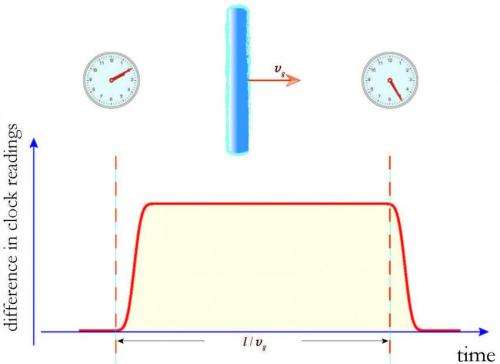This two-clocks-illustration shows the pattern of how two atomic clocks would desynchronize and then resynchronize due to a lump of dark matter sweeping through a Global Positioning System or other atomic clock based network. Credit: Andrei Derevianko, University of Nevada, Reno.
(Phys.org) —It was an interesting time for physics last week as one team of researchers suggested that elusive dark matter may be detected with GPS satellites. They propose testing the idea that dark matter is arranged as groups of topological defects, and that it might be possible to detect such defects using data from a network of atomic clocks and GPS satellites by noting where they go out of sync. Meanwhile, another team has been studying magnetism with the roles of position and momentum reversed—in which the strength of the magnetic field depends on how fast a particle is moving instead of its location. They demonstrated a way to modify current experiments to study the motion of a quantum particle in a momentum-space magnetic field. And yet another team working at the LHCb announced that they'd observed two new baryon particles never seen before.
In news from space, a team of European researchers suggested that gravity may have saved the universe from collapse after the Big Bang due to the Higgs particle. They think gravity could have been the force that overcame the instability that would have been present. Also, researchers looking at data from Philae, the probe that landed on comet 67P/Churyumov-Gerasimenko has found that it "sniffed" organic molecules, before going silent—a finding that could bolster theories that suggest life on Earth came from comets.
In other news, a team of researchers reported that they believe they have found evidence that conclusively shows that Neanderthals were not a sub-species of modern humans—they were instead, a distinct species. Also a startup in New Jersey just might have made a major medical breakthrough, creating a substance called VetiGel, a plant-based polymer that seals wounds in seconds. Imagine if everyone had a canister of the stuff in their first-aid kit—one application could stop bleeding in just seconds, perhaps saving even more lives than portable defibrillators. It's being used by veterinarians on animals already, but has to pass trials before use in humans.
And finally, for those who have been attacking an expanding waistline by abstaining from food altogether for periods of time, a team of researchers has found evidence that suggests that intermittent fasting provides health benefits—they think it's a way of mimicking our hunter/gatherer ancestors who, it is believed, did not generally suffer from obesity.
© 2014 Phys.org























